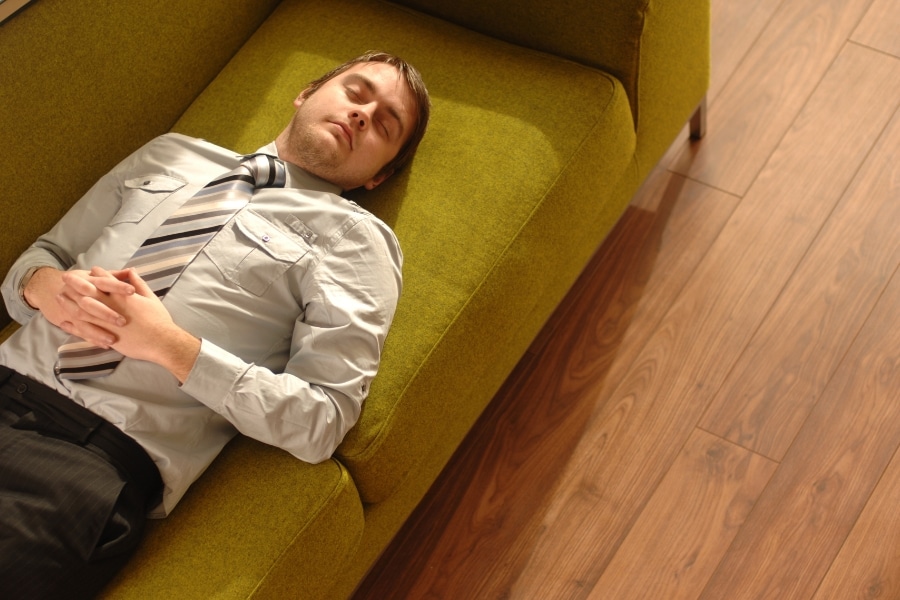Everyone needs a good night’s sleep, but all too often, you find yourself tossing and turning in bed with thoughts racing through your mind. But it doesn’t have to be that way. With the right sleep hygiene habits, you can achieve improved rest and reap better health benefits. This article will go over some simple tips you can use to get better sleep each night so that you wake up feeling refreshed and alert every morning!
Contents
- 1 The Importance Of Sleep
- 2 Tips For Better Sleep Hygiene And Improved Rest
- 3 Establish A Regular Bedtime
- 4 Avoid Caffeine, Alcohol, And Nicotine
- 5 Exercise On A Regular Basis
- 6 Avoid Napping During The Day
- 7 Keep Your Bedroom Temperature Comfortable
- 8 Switch Off All Electronics Before Bedtime
- 9 Avoid Eating Late At Night
- 10 Get Better Sleep Today!
The Importance Of Sleep
Sleep is one of the most important aspects of your daily life. It is a time for your body to rest and recharge, both physically and mentally. Missing just one night’s sleep can lead to extra fatigue, reduced concentration, slower reaction times, and an overall decrease in cognitive abilities.
Even worse, persistent chronic sleep deprivation can cause serious health problems such as hypertension and an increased risk of developing insulin resistance – a key factor in the development of diabetes. That’s why you must make getting enough quality sleep each night a priority. Making sure you get seven to eight hours of uninterrupted sleep will do wonders when it comes to your mental clarity and physical energy levels throughout the day!
Tips For Better Sleep Hygiene And Improved Rest
Establish A Regular Bedtime

For anyone looking to improve their rest, a regular bedtime can help immensely. Establishing a regular sleep schedule helps your body prepare for sleep and lets you know when to settle down into restful slumber. Keeping a consistent bedtime ensures you get the right amount of quality sleep and reduces tossing and turning, ultimately giving you adequate time to recharge each night.
When setting your bedtime routine, just be sure you’re getting enough good rest for yourself – whether that covers seven hours or nine is entirely up to you. A well-established bedtime is essential for proper functioning throughout the day, and consistency will significantly reduce exhaustion and stress associated with an inadequate nighttime routine.
Avoid Caffeine, Alcohol, And Nicotine

Good sleep hygiene is essential for achieving restful and restorative sleep, and while every person’s needs vary, a few main pieces of advice apply to everyone. One of the most basic components of better sleep hygiene is avoiding caffeine, alcohol, and nicotine late in the day.
By staying away from these substances, your body can unwind naturally instead of relying on outside stimulation to move through normal biological processes. Caffeine can interfere with melatonin production, alcohol can cause disruptions in deep sleep stages, and nicotine has a range of potential interactions with hormones that keep you alert. If you’re struggling to get the quality rest you need each night, make sure to avoid these three things for improved sleep results.
Exercise On A Regular Basis

Regular exercise can be a major contributor to better sleep hygiene, meaning setting and sticking to a consistent routine of sleeping and waking times. Exercise helps to keep a body’s internal clock in check, allowing it to better recognize when it’s time for rest. Additionally, getting in physical activity helps one to reach exhaustion levels so that the body is more prepped for quality rest at the end of the day.
Not only that, exercising also releases endorphins which can potentially reduce stress and help treat symptoms of depression or anxiety that can contribute to insomnia. So for improved overall rest, ensuring regular exercise is part of your routine is essential.
Avoid Napping During The Day

While it can be tempting to sneak in a daytime nap, especially when feeling run down or exhausted, it can actually have a more disruptive effect on your sleep cycle than you might imagine. Napping during the day can make you more sleepy at bedtime, making it difficult to fall asleep and stay asleep throughout the night.
To ensure optimal sleep quality, aiming for consistent sleep schedules and avoiding naps are key components to better sleep hygiene. With regular resting patterns, your body adjust and become familiar with sleeping when needed, creating an ideal situation for restorative rest. Remembering that a healthy amount of sleep each night is essential for improved energy levels and overall well-being is enough motivation to ditch the naptime in favor of improving your nightly slumber!
Keep Your Bedroom Temperature Comfortable

With so much to do day-to-day, it’s easy for sleep to get pushed to the side. But good sleep hygiene does not have to be something that’s just beyond reach; taking basic steps like regulating your bedroom temperature can make all the difference in achieving restorative rest. It’s been proven that between 18 and 25 degrees Celsius is an ideal bedroom temperature for achieving quality slumber.
This is because optimal temperatures can prompt your body to naturally produce melatonin, helping you enter a deeply rested state and leave your worries outside the bedroom door. This comfortable temperature can be achieved by using a fan or keeping your window open a crack at night. Properly regulating your sleeping environment may just be what you need to hit the pillow feeling fully restored and ready for another day.
Switch Off All Electronics Before Bedtime

Sleep is otherwise known as the great restorer, allowing you to recharge and face the day again with more energy. However, too often, your hectic lifestyles, combined with hyper-connectivity to all manner of screens within your living spaces, can negatively affect how well you sleep, leaving you feeling drained and fatigued.
Switching off all electronics before bedtime is key in helping to maintain good sleep hygiene, where habits are developed which promote restful slumber. All electronics, including televisions, laptops, and even phones, should be avoided for at least an hour before bedtime. This will allow your body and mind to relax more easily so it can begin the process of winding down for the night, leading to a better quality of sleep overall – now that’s something worth staying up for!
Avoid Eating Late At Night

Eating late at night can significantly impact your ability to get quality rest at night. Late-night grazing affects how quickly you fall asleep and how deeply you sleep throughout the night. Your internal clock—or circadian rhythm—is important in regulating your sleep patterns, and eating late at night can throw off this rhythm, leading to reduced energy levels and daytime tiredness.
To ensure that you get the most out of your nightly rest, it’s important to avoid eating late at night and opt for earlier meals or light snacks instead. This will result in improved sleep hygiene and better overall rest too!
Get Better Sleep Today!
Sleep hygiene is essential for overall well-being since it affects how your body and minds react to everyday tasks. Following the guidelines outlined above, like setting a consistent sleep schedule and avoiding late-night snacks, will allow you to get the best possible rest each night. If you’re looking for improved energy levels or an all-around healthier lifestyle, adopting better sleep hygiene habits today is the first step!


